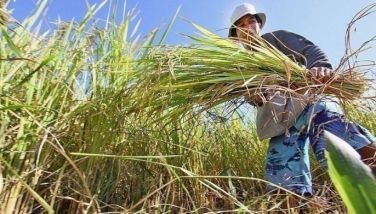Green Gold: Power from coconut
October 22, 2006 | 12:00am
Microsoft is into it, and if the software giant believes in it, could others be far behind?
The Philippines is actually in the lead when it comes to green gold, or so-called biofuels from plants.
Microsoft is putting up a huge biodiesel plant with a 750,000-ton capacity. India and Indonesia are investing on biofuels and the Philippines leads in the development of biodiesel from coconuts. Asia — including Indonesia and the Philippines — are developing experimental plantations of the jatropha plant for biodiesel with D1-Oil of South Africa providing the technology.
Biodiesel from coconut is a Philippine initiative and its research and study for fuel application had been conducted by the Asian Institute of Petroleum Studies (AIPSI) with the support of leading coconut methyl ester manufacturers in the Philippines — Chemrez Inc. and Senbel Fine Chemicals Inc.
It was initially undertaken to provide a long-term, high volume, and sustainable alternative domestic market for coconut oil. To ensure its acceptance, AIPSI funded the first laboratory test conducted in the United States in 2001. The excellent results became the foundation that led to the development of cocodiesel in the country.
After five years of extensive laboratory test and analysis — for example, at the Southwest Research Institute in San Antonio, Texas — as well as field tests, the Philippines is now much ahead of its neighboring countries in cocodiesel technology. A private company, Chemrez, has in fact opened a 60,000-ton-capacity biodiesel plant, the first in Asia.
The Philippine cocodiesel program initially calls for only one-percent blend (B1) which is the lowest in the world. Its objective is simply to displace one-percent diesel with one-percent cocodiesel and start the energy self-sufficiency program no matter how small.
Numerous mileage tests on engines three years old and above have registered mileage improvement of from 10 percent to as high as 25 percent. Even with just a 10-percent mileage improvement, fuel consumption is reduced by nine percent. At a diesel pump price of P35.50 per liter, this translates to savings of P3.23 per liter.
Since the estimated annual diesel demand in the Philippines is seven billion liters, the cocodiesel program requiring a blend of only one percent translates to 70 million liters per year of coconut methyl ester sourced from the coconut industry.
If sold at P50 per liter, new money for the coconut and oleochemical industry will be P 3.5 billion per year, which otherwise will be lost to crude oil exports.
Further savings from the one-percent cocodiesel blend will save P2.3 billion in imported fuel and P21.1 billion in reduced fuel consumption from mileage economy or a total of P23.3 billion.
Cocodiesel is the only renewable diesel fuel in the world that is closest to the ideal diesel in its natural state (with no additives). It contains unique features not found in other biodiesels: it is 91 percent saturated (or just nine percent short of the ideal diesel) and has a lower ignition temperature for cleaner combustion.
It requires little or no anti-oxidant additives and has excellent combustion characteristics. It needs little enhancements, and only on properties that it lacks — for example, lubricity.
The commercial diesel now available is a blend of imported additives that ultimately ups the cost of this fuel. In contrast, cocodiesel — or coconut methyl ester — is coconut oil that has been converted to a diesel-like product through the removal of glycerine. What’s left is the fatty substance known as methyl ester, a diesel-like derivative of coconut oil.
The high solvency characteristics of coconut methyl esters — not normally present in other biodiesels — cleanses the fuel lines, decarbonizes the combustion chamber and declogs the fuel nozzles to restore engine efficiency. These result in high mileage.
Compared to most biodiesels, cocodiesel is a premium product. Even with as little as a one-percent blend with conventional diesel, cocodiesel fuel restores fuel system and engine efficiency: Old engines with heavy carbon soot deposits and with clogged fuel nozzles are also cleansed. — InterNews&Features
The Philippines is actually in the lead when it comes to green gold, or so-called biofuels from plants.
Microsoft is putting up a huge biodiesel plant with a 750,000-ton capacity. India and Indonesia are investing on biofuels and the Philippines leads in the development of biodiesel from coconuts. Asia — including Indonesia and the Philippines — are developing experimental plantations of the jatropha plant for biodiesel with D1-Oil of South Africa providing the technology.
Biodiesel from coconut is a Philippine initiative and its research and study for fuel application had been conducted by the Asian Institute of Petroleum Studies (AIPSI) with the support of leading coconut methyl ester manufacturers in the Philippines — Chemrez Inc. and Senbel Fine Chemicals Inc.
It was initially undertaken to provide a long-term, high volume, and sustainable alternative domestic market for coconut oil. To ensure its acceptance, AIPSI funded the first laboratory test conducted in the United States in 2001. The excellent results became the foundation that led to the development of cocodiesel in the country.
After five years of extensive laboratory test and analysis — for example, at the Southwest Research Institute in San Antonio, Texas — as well as field tests, the Philippines is now much ahead of its neighboring countries in cocodiesel technology. A private company, Chemrez, has in fact opened a 60,000-ton-capacity biodiesel plant, the first in Asia.
The Philippine cocodiesel program initially calls for only one-percent blend (B1) which is the lowest in the world. Its objective is simply to displace one-percent diesel with one-percent cocodiesel and start the energy self-sufficiency program no matter how small.
Numerous mileage tests on engines three years old and above have registered mileage improvement of from 10 percent to as high as 25 percent. Even with just a 10-percent mileage improvement, fuel consumption is reduced by nine percent. At a diesel pump price of P35.50 per liter, this translates to savings of P3.23 per liter.
Since the estimated annual diesel demand in the Philippines is seven billion liters, the cocodiesel program requiring a blend of only one percent translates to 70 million liters per year of coconut methyl ester sourced from the coconut industry.
If sold at P50 per liter, new money for the coconut and oleochemical industry will be P 3.5 billion per year, which otherwise will be lost to crude oil exports.
Further savings from the one-percent cocodiesel blend will save P2.3 billion in imported fuel and P21.1 billion in reduced fuel consumption from mileage economy or a total of P23.3 billion.
Cocodiesel is the only renewable diesel fuel in the world that is closest to the ideal diesel in its natural state (with no additives). It contains unique features not found in other biodiesels: it is 91 percent saturated (or just nine percent short of the ideal diesel) and has a lower ignition temperature for cleaner combustion.
It requires little or no anti-oxidant additives and has excellent combustion characteristics. It needs little enhancements, and only on properties that it lacks — for example, lubricity.
The commercial diesel now available is a blend of imported additives that ultimately ups the cost of this fuel. In contrast, cocodiesel — or coconut methyl ester — is coconut oil that has been converted to a diesel-like product through the removal of glycerine. What’s left is the fatty substance known as methyl ester, a diesel-like derivative of coconut oil.
The high solvency characteristics of coconut methyl esters — not normally present in other biodiesels — cleanses the fuel lines, decarbonizes the combustion chamber and declogs the fuel nozzles to restore engine efficiency. These result in high mileage.
Compared to most biodiesels, cocodiesel is a premium product. Even with as little as a one-percent blend with conventional diesel, cocodiesel fuel restores fuel system and engine efficiency: Old engines with heavy carbon soot deposits and with clogged fuel nozzles are also cleansed. — InterNews&Features
BrandSpace Articles
<
>
- Latest
Latest
Latest
March 27, 2025 - 2:48pm
March 27, 2025 - 2:48pm
March 26, 2025 - 3:46pm
By Dominique Nicole Flores | March 26, 2025 - 3:46pm
February 28, 2025 - 11:26am
By Dominique Nicole Flores | February 28, 2025 - 11:26am
February 24, 2025 - 6:28pm
By Dominique Nicole Flores | February 24, 2025 - 6:28pm
February 19, 2025 - 7:28pm
By Dominique Nicole Flores | February 19, 2025 - 7:28pm
Recommended






























